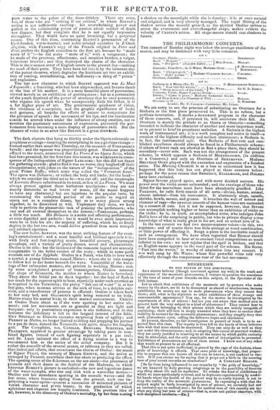The dark clusters that hang so thickly under the Opera
colonnade on propitious evenings—insuring the enterprising le. see a glorious vintage- -formed earlier than usual this Thursday, on the occasion of FORNASARI'S benefit : and the squeeze was proportionably great. Ominous placards affixed to the doors, announced that La Prove d' un Opera Seria, which bad been promised, for the first time this season, was withdrawn in conse- quence of the indisposition of Signor LABLACHE: but this did not daunt the gathering crowds : glad to find it was no worse, they laughed off their disappointment, with jokes on the nature of the " indisposition " of the great Primo Buffo ; which some wag called the " Fornasari fever." The opera was Belisario; or rather, the body and limbs ; for the head— which we consider the third act to be—was cut off; and the catastrophe of Lucrezia Borgia substituted in its stead, in lieu of La Prove. We must always protest against these barbarous mutilations : they are not merely distasteful to real lovers of music, (if the music happens to have any character,) but are injurious to the popular taste, by accustoming the unlearned portion of the public to regard an -opera not as a complete drama, but as so many pieces strung together, to be dissevered at will. Unpleasant duty done, we have only to perform the pleasurable task of praising the performers ; who one and all exerted themselves to the utmost,—Fonsesma, perhaps, a little too much. His Belisario is a noble and affecting performance, at once dignified and pathetic : but it would be even more impressive were he to hide his art ; the majesty of suffering, which he, so finely depicts in the last two acts, would derive grandeur from more tranquil and subdued emotions.
The new ballet, however, was the most striking feature of the even- ing's entertainment : and a most fanciful and brilliant spectacle it is ; with lively and foot-inspiring music, beautiful scenery, picturesque groupings, and a variety of pretty dances, novel and characteristic. Ondine is its title: but the incidents of the romantic legend are scarcely recognizable in the ballet version of the story ; which in some parts reminds one of La Sylphide. Ondine is a Naiad, who falls in love with a mortal, a young fisherman named Matted ; whom she in vain tempts to follow her to her home beneath the wave. Unmindful of the warn- ings of her submarine mamma, she persists in wedding Matteo ; and, by some unexplained process of transmigration, Ondine assumes the shape of Giaunetta, the maiden to whom Matteo is betrothed. They dance the bridal pas de deux together : but the load of flesh is -too much for the aqueous spirit to bear, especially under such exertion as is required in the Tarantella ; the pretty " fish out of water" is at her last gasp, when mamma arrives at the nick of time, in a dolphin cur- ricle, and a transference of persons is effected: Ondine is taken back to her oozy bed, and Giannetta's spirit being restored to its body, Matted clasps his mortal bride, to their mutual contentment. CERITO as Ondine floats about as if she were spurting in her native ele- ment; and her movements are as graceful as they are light and buoyant: only in pantomimic expression is she deficient, and in this instance the deficiency is felt in the languid interest of the fable. GUY SrEvilati as Gianetta executes surprising feats of agility ; and PERROT as 111atteo, no longer limited to lifting and propping his partner in a pas de deux, danced the Tarantella with spirit, despite his limping gait. The Coryphees, too, CAMILLE, BERNARD, SCHEFFER, and PLANQOET, appeared to greater advantage by taking parts in com- bined figures, instead of each figuring separately in a pas seul ; and ST. LEON imitated the effect of a flying motion in a way to recommend him to the notice of the aerial company. But it is rather the ensemble of the several scenes, or tableaux as they are called, than individual efforts, that constitutes the charm of Ondine: the music of Signor PUGNI, the scenery of Mee re. GRIEVE, and the action as arranged by PERROT, contribute their due share to producing the effect. The opening scene of the fishermen on the sea-shore—the procession of peasants and their dance at the festival of the Madonna, in which Leoroth ROBERT'S picture is embodied—the new and ingenious dance of the water-nymphs, who rise and sink with a wave-like motion— Outline and her attendants sporting in the moonlit waves—and the last scene, where fountains spring from the ground, each one im- prisoning a water-sprite--present a succession of animated pictures of varied character and poetic beauty, in the production of which splendour and elegance are happily combined. The prettiest idea of all, however, is the discovery of Ondine's mortality, by her form casting a shadow on the moonlight while she is dancing : it is at once natural and original, and is very cleverly managed. The rapid flitting of the shadow across the moonlit ground, as the startled Ondine strives to arrest the evanescent and ever-changeful shape, makes evident the velocity of CERITO'S action. All stage-moons should cast shadows in future.


























 Previous page
Previous page